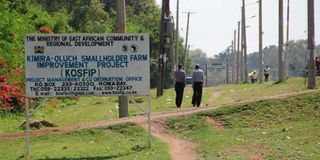Controversy rocks handover of multi-billion project to LBDA

Kimira Oluch Smallholder Farm Improvement Project (Kosfip) office in Homa Bay Town.
Controversy has rocked a multi-billion Nyanza agricultural project over the planned handover to the Ministry of Regional Development.
Farmers are opposed to the proposed handover of the Sh7 billion Kimira Oluch Smallholder Farm Improvement Project (Kosfip) in Homa Bay County to the Lake Basin Development Authority (LBDA). They say they fear it could be a scheme by politicians to milk it for 2022 campaign funding.
Kosfip is an irrigation project in Rangwe and Rachuonyo North Sub-counties that was funded by the African Development Bank (ADB) and the national government. It was meant to benefit over 20, 000 farmers and boost food security in Nyanza region.
Its budget during take-off in 2007 was Sh6 billion, but it has since increased to Sh7.5 billion, with Sh7.1 billion spent so far.
The project was supposed to be handed over to a government body for management after completion.
But now, farmers say they are should be consulted on who takes over management of the project. They are accusing Principal Secretary Belio Kipsang of handing it over to LBDA without informing them.
Workers at the project have been locked out of their offices in the controversial handover politics.
Armed police officers replaced regular security guards at the gate of the project management and coordinator offices located in Homa Bay town this week. They said they were instructed not to let anyone inside the premises.

Armed police officers at Kimira Oluch Smallholder Farm Improvement Project (Kosfip) office in Homa Bay Town on September 14, 2021.
Some project staff who spoke on condition of anonymity said they were told not to report for duty because of a controversy surrounding the management of the project run by the Ministry of East African Community and Regional Development.
Others said they went to work as usual on Monday only to be told to go back home and wait for communication from their bosses on when to return to work.
Although the irrigation project was designed to benefit more than 20,000 farmers, only 1,500 farmers in the two sub-counties are using it regularly.
LBDA plans to take over the management of the project to make it profitable to farmers. Mr Raymond Omollo, LBDA managing director, confirmed that Kosfip will be handed over to the regional development agency.
But farmers opposed the plans arguing the process is controversial and meant to benefit a few people, including politicians who intend to use money meant to help farmers to conduct political campaigns in 2022.This claim, however, is unfounded.
Oluch scheme chairman, Mr Joshua Robi, said farmers have not been consulted on the transfer.
“We will hold a meeting this week and decide on the best way forward. For now, we are opposed to any plans to have a different government body taking over the project. We have notified police about our plans to demonstrate,” Mr Robi said.
He told Nation that it will be a disservice to farmers if Kosfip is handed over to another body when incomplete.
“The project should first of all be complete before we can discuss who manages it. All farmers will benefit if this happens. Besides, no one has called us for a meeting to discuss how the project can be handed over to a different origination so we sense malice,” he said.
The infrastructure
The project has at least 59 kilometres main canals and 122 kilometres tertiary canals which draw water from River Awach Tende and Awach Kibuon, which are then used to support agriculture through irrigation in an area covering 3685 acres (1474 hectares) which is subdivided into 97 irrigation blocks.
The land where the project covers is capable of addressing regional food security by producing food crops and high value crops such as fruits and vegetables for sale both regionally and internationally.
Since 2007 when the foundation of the project was laid, construction work of canals which were supposed to take six years to complete, is still pending with some residents who were being targeted by the project yet to benefit.
Kosfip steering committee members, Kisera Osano and Lilian Owino, said the team is yet to decide on who should manage the project including the exit strategy of the Ministry of East African Community and Regional Development.
Kosfip is currently 82 per cent complete.





